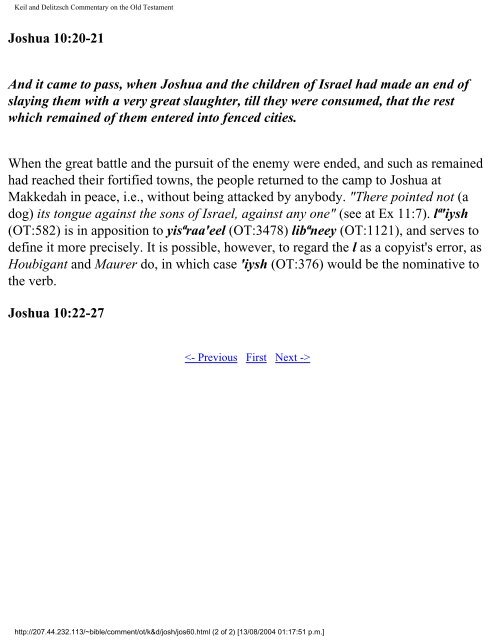Commentary on Joshua - Keil & Delitzsch - David Cox
Commentary on Joshua - Keil & Delitzsch - David Cox Commentary on Joshua - Keil & Delitzsch - David Cox
Keil and Delitzsch
Keil and Delitzsch
- Page 83 and 84: Keil and Delitzsch Commenta
- Page 85 and 86: Keil and Delitzsch Commenta
- Page 87 and 88: Keil and Delitzsch Commenta
- Page 89 and 90: Keil and Delitzsch Commenta
- Page 91 and 92: Keil and Delitzsch Commenta
- Page 93 and 94: Keil and Delitzsch Commenta
- Page 95 and 96: Keil and Delitzsch Commenta
- Page 97 and 98: Keil and Delitzsch Commenta
- Page 99 and 100: Keil and Delitzsch Commenta
- Page 101 and 102: Keil and Delitzsch Commenta
- Page 103 and 104: Keil and Delitzsch Commenta
- Page 105 and 106: Keil and Delitzsch Commenta
- Page 107 and 108: Keil and Delitzsch Commenta
- Page 109 and 110: Keil and Delitzsch Commenta
- Page 111 and 112: Keil and Delitzsch Commenta
- Page 113 and 114: Keil and Delitzsch Commenta
- Page 115 and 116: Keil and Delitzsch Commenta
- Page 117 and 118: Keil and Delitzsch Commenta
- Page 119 and 120: Keil and Delitzsch Commenta
- Page 121 and 122: Keil and Delitzsch Commenta
- Page 123 and 124: Keil and Delitzsch Commenta
- Page 125 and 126: Keil and Delitzsch Commenta
- Page 127 and 128: Keil and Delitzsch Commenta
- Page 129 and 130: Keil and Delitzsch Commenta
- Page 131 and 132: Keil and Delitzsch Commenta
- Page 133: Keil and Delitzsch Commenta
- Page 137 and 138: Keil and Delitzsch Commenta
- Page 139 and 140: Keil and Delitzsch Commenta
- Page 141 and 142: Keil and Delitzsch Commenta
- Page 143 and 144: Keil and Delitzsch Commenta
- Page 145 and 146: Keil and Delitzsch Commenta
- Page 147 and 148: Keil and Delitzsch Commenta
- Page 149 and 150: Keil and Delitzsch Commenta
- Page 151 and 152: Keil and Delitzsch Commenta
- Page 153 and 154: Keil and Delitzsch Commenta
- Page 155 and 156: Keil and Delitzsch Commenta
- Page 157 and 158: Keil and Delitzsch Commenta
- Page 159 and 160: Keil and Delitzsch Commenta
- Page 161 and 162: Keil and Delitzsch Commenta
- Page 163 and 164: Keil and Delitzsch Commenta
- Page 165 and 166: Keil and Delitzsch Commenta
- Page 167 and 168: http://207.44.232.113/~bible/commen
- Page 169 and 170: http://207.44.232.113/~bible/commen
- Page 171 and 172: Keil and Delitzsch Commenta
- Page 173 and 174: Keil and Delitzsch Commenta
- Page 175 and 176: Keil and Delitzsch Commenta
- Page 177 and 178: Keil and Delitzsch Commenta
- Page 179 and 180: Keil and Delitzsch Commenta
- Page 181 and 182: Keil and Delitzsch Commenta
- Page 183 and 184: Keil and Delitzsch Commenta
<strong>Keil</strong> and <strong>Delitzsch</strong> <str<strong>on</strong>g>Commentary</str<strong>on</strong>g> <strong>on</strong> the Old Testament<br />
<strong>Joshua</strong> 10:20-21<br />
And it came to pass, when <strong>Joshua</strong> and the children of Israel had made an end of<br />
slaying them with a very great slaughter, till they were c<strong>on</strong>sumed, that the rest<br />
which remained of them entered into fenced cities.<br />
When the great battle and the pursuit of the enemy were ended, and such as remained<br />
had reached their fortified towns, the people returned to the camp to <strong>Joshua</strong> at<br />
Makkedah in peace, i.e., without being attacked by anybody. "There pointed not (a<br />
dog) its t<strong>on</strong>gue against the s<strong>on</strong>s of Israel, against any <strong>on</strong>e" (see at Ex 11:7). lª'iysh<br />
(OT:582) is in appositi<strong>on</strong> to yisªraa'eel (OT:3478) libªneey (OT:1121), and serves to<br />
define it more precisely. It is possible, however, to regard the l as a copyist's error, as<br />
Houbigant and Maurer do, in which case 'iysh (OT:376) would be the nominative to<br />
the verb.<br />
<strong>Joshua</strong> 10:22-27<br />
<br />
http://207.44.232.113/~bible/comment/ot/k&d/josh/jos60.html (2 of 2) [13/08/2004 01:17:51 p.m.]



